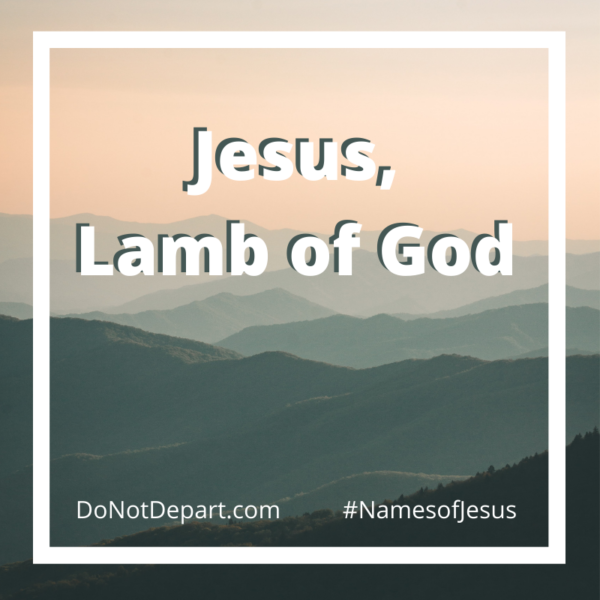Welcome to Do Not Depart! Be sure to subscribe to the Do Not Depart RSS feed or email updates to receive regular encouragement and tools to abide in God's Word.
Today we continue our look at the names of Jesus with a title pronounced by John the Baptist at the very beginning of Jesus’s ministry: The Lamb of God.

Today is the third day without running water at our house, thanks to a broken pipe. Without water for washing dishes and clothes, bathing, and flushing toilets, I’ve become increasingly aware of “clean” and “unclean.” It takes a lot of effort to keep things clean! It’s hard to keep a kitchen clean, floors clean, and bodies clean without running water. It seems we, and our things, require continual washing to stay even “clean enough,” which is as high as my standards get right now.
This is true of our spiritual lives as well as our physical lives!
In preparing people’s hearts for Jesus, John the Baptist called people to repent, to turn away from sin, pointing them instead toward Jesus Christ. John the Baptist, seeing Jesus, declared, “Behold, the Lamb of God, who takes away the sin of the world! (John 1:29)”
While the phrase “Lamb of God” may be familiar to us. It must have been striking to first century Jews to hear this description applied to a man. The Jews were accustomed to the sacrifice of animals to atone for sin, but the suggestion that a man would fill this role may have been shocking.
Why would this man from Galilee be called the Lamb of God?
Entire books could be written exploring Jesus as the Lamb of God. The theology here begins with the rift between man and God created by sin. God established the blood of the lamb as the way of salvation when Moses led the enslaved Israelites out of Egypt.
And then in the laws recorded in the books of Leviticus and Numbers, God outlines the Day of Atonement rituals and the animal sacrifices as sin and guilt offerings, cleansing the Israelites of sin (Leviticus 16:30). To summarize very briefly, the blood of animal sacrifices provided temporary reconciliation between the Israelites and God, but atonement had to be sought again and again.
The Passover Lamb
The twelfth chapter of Exodus outlines the instructions God gave the Israelites for the first Passover, and it was celebrated similarly thereafter on the dates outlined in Scripture. In Jesus’s time, Passover was celebrated in Jerusalem.
On the 10th of Nisan each year, flawless, male, year-old lambs were brought from the surrounding areas, like Bethlehem, where they were carefully raised by area shepherds. They were brought into Jerusalem and held for four days. The lambs were inspected for blemish and, if found to be perfect, they were sacrificed just before evening on Nisan 14th. Each family then spread the blood of the lamb on their door posts and ate its meat, along with wine and unleavened bread, as they retold the story of the first Passover, recounting how God had redeemed Israel from slavery in Egypt and brought them to freedom.
Also the Passover Lamb
And then one year, in the days just before Passover, Jesus of Nazareth entered Jerusalem on a donkey on Nisan 10. The crowds waved palm branches and cried, “Hosanna!”
Jesus taught, and he cleansed the Temple. He ate in the upper room with his disciples, prayed in the garden, was betrayed, and sat trial.
Just the Passover lambs were brought into the city on Nisan 10th and examined before the sacrifice, so was Christ. As the lambs were confirmed to be faultless, so did Pilate declare of Jesus: “I find no guilt in him,” (John 18:38). He had entered Jerusalem as He had lived His life, without sin, though on the cross He bore all our sin.
Jesus was crucified, giving up His spirit about 3pm on Nisan 14, as the Passover lambs were sacrificed.
Washed in the Blood of the Lamb
With this final sacrifice, Jesus Christ covered our sin completely, ending forever the need for blood sacrifices in the Temple. As Jesus spoke to his disciples the night that he was betrayed, “this is my blood of the covenant, which is poured out for many for the forgiveness of sins” (Matthew 26:28).
It’s hard to keep things clean. As I’ve been reminded this week, keeping people and homes even just “clean enough” requires a lot of water – washing and re-washing — not so different from the system of repeated animal sacrifices for the forgiveness of sins. But Christ… well, nothing else in life that makes us completely, faultlessly clean. His sacrifice and forgiveness are all-encompassing and completely sufficient. There is, as they say power in the blood of the Lamb.

Join the Discussion